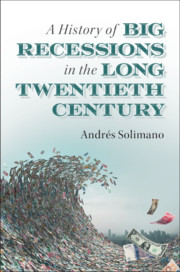Book contents
- A History of Big Recessions in the Long Twentieth Century
- A History of Big Recessions in the Long Twentieth Century
- Copyright page
- Dedication
- Contents
- Figures
- Tables
- Boxes
- Acknowledgments
- 1 Introduction
- 2 Recession and Depression
- 3 World War I, Hyperinflation in the 1920s, and World War II
- 4 The Great Depression of the 1930s
- 5 Stagflation in the 1970s, Globalization, and the Financial Crisis of 2008–2009
- 6 Two Depressions in the Early Twenty-First Century
- 7 Soviet-Type Socialism and the Postsocialist Transition
- 8 Economic Crises in Latin America and East Asia
- 9 Synthesis and Interpretation
- Appendix
- References
- Index
5 - Stagflation in the 1970s, Globalization, and the Financial Crisis of 2008–2009
Published online by Cambridge University Press: 06 February 2020
- A History of Big Recessions in the Long Twentieth Century
- A History of Big Recessions in the Long Twentieth Century
- Copyright page
- Dedication
- Contents
- Figures
- Tables
- Boxes
- Acknowledgments
- 1 Introduction
- 2 Recession and Depression
- 3 World War I, Hyperinflation in the 1920s, and World War II
- 4 The Great Depression of the 1930s
- 5 Stagflation in the 1970s, Globalization, and the Financial Crisis of 2008–2009
- 6 Two Depressions in the Early Twenty-First Century
- 7 Soviet-Type Socialism and the Postsocialist Transition
- 8 Economic Crises in Latin America and East Asia
- 9 Synthesis and Interpretation
- Appendix
- References
- Index
Summary
This chapter focuses on growth transition from the “Golden Age” (from 1950 to the early 1970s) of rapid growth, lower wealth inequality, and the absence of international financial crises during the stagflation in the 1970s (inflation, monetary instability, stagnation) and then to the neoliberal era (with volatile growth and frequent crises) in the core economies of North America and western Europe. The chapter identifies both economic and political economy factors surrounding the stagflation of the 1970s, in the context of challenges to US hegemony, and postauthoritarian transition in southern Europe. The chapter examines the frequency and intensity of recessive episodes and their impact on per capita GDP and investment from 1970 to 2015, affecting both core advanced countries and the European periphery.
Keywords
- Type
- Chapter
- Information
- A History of Big Recessions in the Long Twentieth Century , pp. 88 - 113Publisher: Cambridge University PressPrint publication year: 2020



